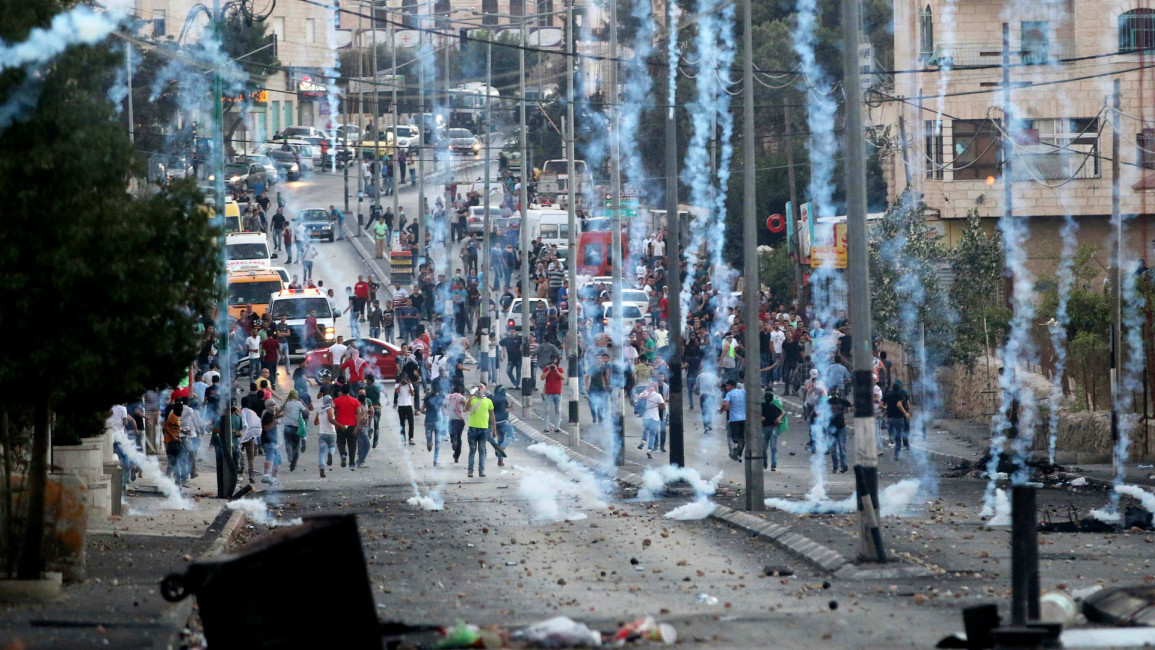
The Palestinian uprising proves the division of Jerusalem
One of the most important things so far to come out of the current Palestinian uprising in Jerusalem and the West Bank is that it exposes the Israeli fallacy of a unified Jerusalem.
This issue has taken centre stage in Israeli society for the past year, especially since the kidnap and burning alive of Palestinian child Mohammed Abu Khdeir, which revealed the true extent of the city's demographic, geographic and economic divisions.
But current events also prove that the gap between East and West Jerusalem is growing ever wider and cannot be bridged anytime soon.
Furthermore, the slogan of a unified Jerusalem that is to be "Israel's eternal capital" no longer convinces wide segments of Israeli society - despite Israeli efforts to overrun the city with illegal settlements and drive out its Palestinian population with various forms of discrimination.
Israel cannot comprehend how more than a third of its capital's residents are Palestinians who are viewed as enemies - especially since most do not hold Israeli citizenship but only temporary residency permits that could be withdrawn without notice.
More than a year ago, Nir Barkat, the Israeli mayor of occupied Jerusalem, admitted that he did not know his way around many Arab neighbourhoods in East Jerusalem and that he does not dare enter many Palestinian neighbourhoods - in the city he claims to be unified and of which he is mayor.
| The slogan of a unified Jerusalem that is to be 'Israel's eternal capital' no longer convinces wide segments of Israeli society |
However, a few days ago, Barkat appeared in Jerusalem's Palestinian areas in the north - carrying a machine gun and surrounded by tens of heavily armed soldiers who were there to quell the popular uprising that proves the Palestinian identity of the city.
Barkat's appearance also exposes him as an agent of the occupation who does not represent the city or its original residents, but serves a settler colonial institution that aims to drive out the city's natives.
If one was to walk through the Palestinian neighbourhoods and see the number of occupying soldiers, checkpoints and other units, in addition to the complete lack of Israeli Jews and the fear that Israeli police live in, one would certainly conclude that the uprising has proven the city's Palestinian identity.
Palestinian residents of Jerusalem have decided to launch their battle in defence of the al-Aqsa mosque and the city's other holy sites, and in defence of their existence no matter the cost, especially after political and international solutions have proven futile in stopping Israel's colonial project.
That project aims to Judaise the city of Jerusalem and divide the al-Aqsa mosque, by only allowing Muslims into the mosque grounds during limited times to enable right-wing Jewish nationalists to enter the mosque compound. There are widespread beliefs here that the Israelis would then use some international crisis to destroy the mosque and replace it with the "third temple".
While the al-Aqsa Mosque suffers changes to its character, Israel continues its repressive social, political and economic policies against the city, especially since Binyamin Netanyahu believes that the Palestinian issue is no longer on the international agenda.
| Before Netanyahu's return from the UN in New York, Palestinians had launched resistance operations against the Israeli colonial project |
This was made clear to Netanyahu by the fact US President Barack Obama did not mention the Palestinian issue at all during his recent speech at the UN General Assembly.
Netanyahu reportedly understood this as a green light to step up a gear with his colonial project in Jerusalem and the West Bank unhindered.
However, even before Netanyahu's return from the UN in New York, Palestinians had launched resistance operations against the Israeli colonial project, not only in Jerusalem, but also in the West Bank, which Netanyahu believed was "neutralised".
The current popular uprising in the Palestinian territories demonstrates that Palestinians in Jerusalem and the West Bank have a large strategic reserve that will enable them to refocus the world's attention on their struggle.
More importantly, the uprising has exposed the reality of the city of Jerusalem, which is an occupied and divided city - and not a united, eternal capital of Israel, as Zionist politicians like to claim.
Opinions expressed in this article remain those of the author and do not necessarily represent those of al-Araby al-Jadeed, its editorial board or staff.



